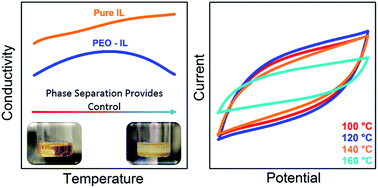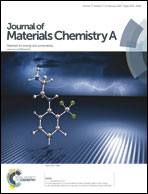Responsive electrolytes that inhibit electrochemical energy conversion at elevated temperatures
Abstract
Energy storage has emerged as a critical challenge due to the increasing demand to utilize energy from intermittent, renewable resources. Furthermore, growing interest in decreasing our dependence on petroleum necessitates the development of safe and efficient energy storage for transportation. Li-ion batteries have emerged as the premier candidate to meet these demands; however, such systems are limited by thermal hazards (runaway reactions, fires, explosions), which become increasingly dangerous in large-format batteries. We have developed an electrolyte system comprising poly(ethylene oxide), an ionic liquid and lithium salt that exhibits an intrinsic mechanism for inhibiting device operation when the temperature increases beyond a given threshold, which is attributed to polymer–ionic liquid phase separation. In the following article, we describe how the thermally activated phase separation causes a decrease in ion conductivity, thereby affecting the concentration of ions at the electrode, in addition to an increase in charge transfer resistance from the formation of a polymer coating on the porous electrode. Such mixtures provide a transformative approach to regulating electrochemical processes, which is necessary to achieve inherently safe operation of large format Li-ion batteries.


 Please wait while we load your content...
Please wait while we load your content...